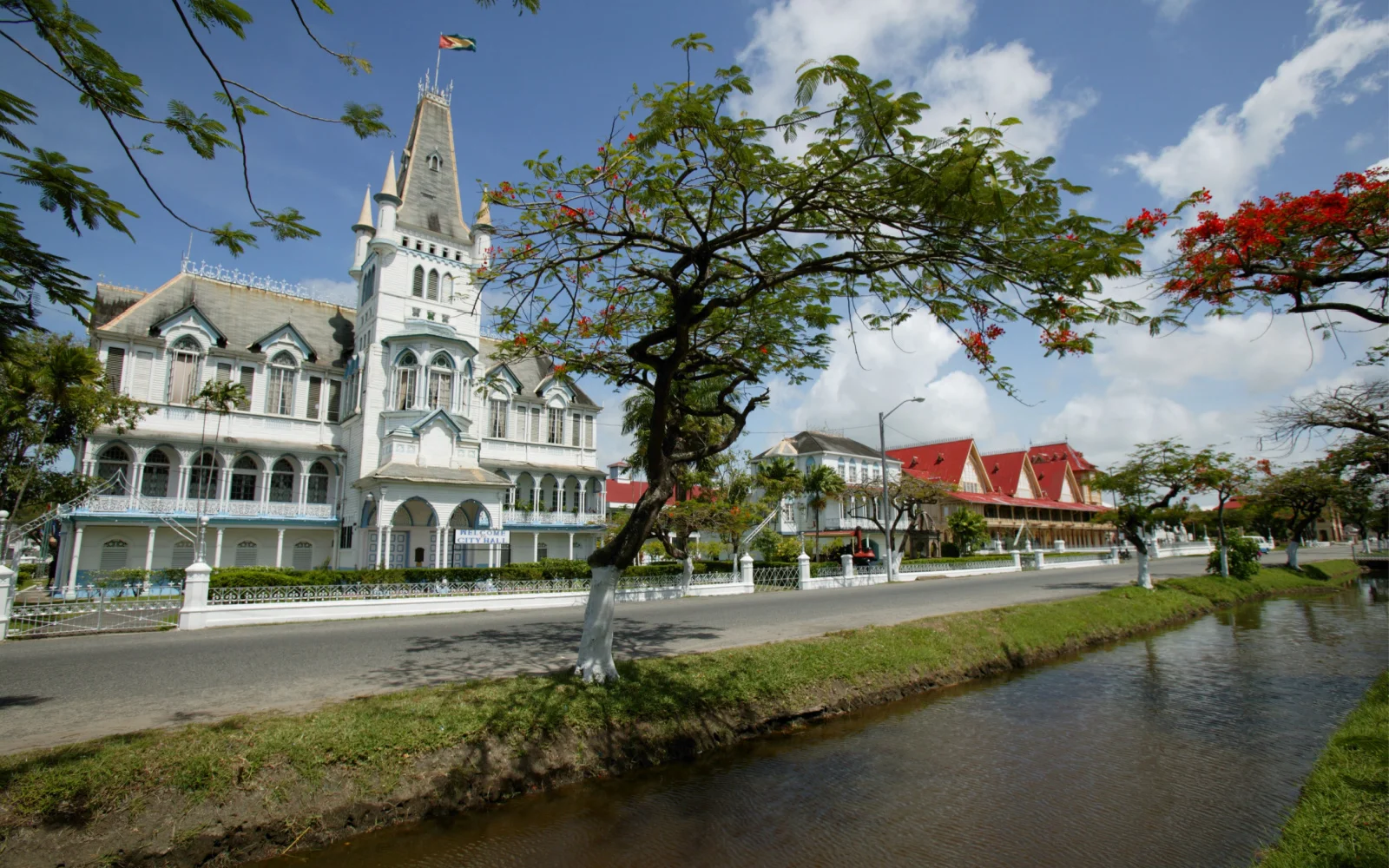The country of Guyana is off the beaten path for most visitors, but those who do visit are rewarded with amazing nature. Guyana is perched on the Caribbean Coast but also contains mountains, grasslands, and forests.
Guyana has some of the highest forest cover of any country in the world at 87%, and a large part of that forest is part of the Amazon Rainforest.
Special natural areas in Guyana include Kaieteur National Park, which features one of the highest single-drop waterfalls in the world, and the Iwokrama Wildlife Tour.
Visitors will also be rewarded with a glimpse at Guyana’s culture, which blends influences from indigenous people and the descendants of African slaves and South Asian indentured servants.
But while this storied country is rich in history, culture, and amazing sights to see, is Guyana safe to visit? Here’s our take.
Is Guyana Safe to Visit in 2025?
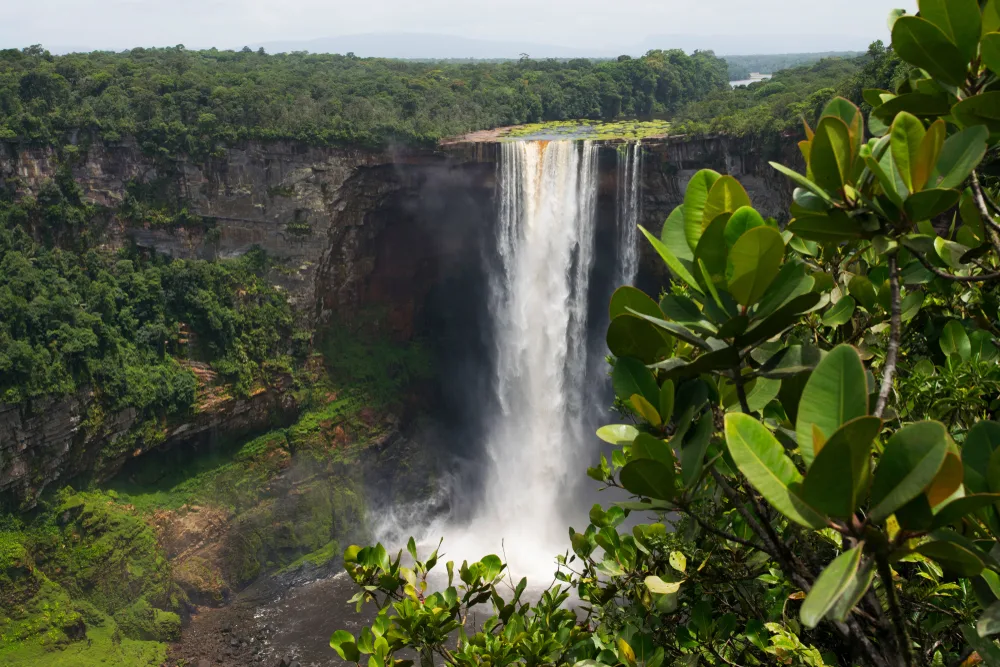
528hz Photos/Shutterstock
No. Guyana is not the safest place to visit in the world, or even in South America. The country is not well-developed, which means that many regions are missing vital tourist infrastructure.
There are also high levels of crime, especially petty crime, which law enforcement is often powerless to stop. Most countries have some sort of travel advisory in place for traveling to Guyana, although they are not uniform in terms of their risk assessment level.
For example, Australia has a level two travel advisory in place for Guyana, telling its citizens to exercise a high degree of caution. The United States is more severe, telling its citizens to reconsider travel to Guyana entirely (the third level on the travel advisory) due to high levels of violent crime.
Common crimes in Guyana include:
- Pickpocketing
- Bag snatching
- Scams
- Sexual assault
- Armed robbery
- Assault
- Murder
As you can see, the list of dangers is not exactly short. Besides crime, you should be aware of potential natural disasters when you travel to Guyana.
During the rainy seasons, especially the period from April to August, flooding is common along the coast. Try to avoid traveling during this time as rescue infrastructure is not the best in Guyana.
In general, keep in mind that the infrastructure in Guyana is probably not as well-developed as it is in your home country. Roads are poorly maintained and often dangerous, especially in the interior.
There are entire areas of the country where the police department has no jurisdiction, not due to criminal control but because they physically cannot get to remote areas. The health situation in Guyana is also not the safest.
Authorities such as the CDC advise travelers to get additional vaccinations before traveling, such as hepatitis, malaria, rabies, and typhoid.
Yellow fever vaccinations are mandatory to go to Guyana. You can also get sick from untreated water or poorly prepared food, so it’s best to pack some medications and have good travel insurance before you go.
Crime in Guyana
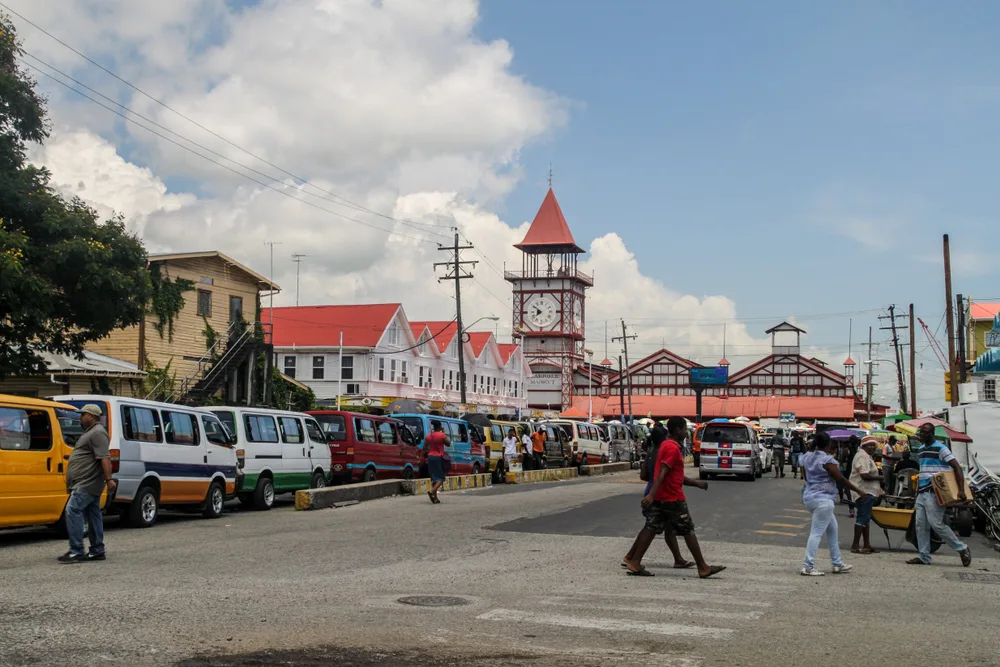
GEORGETOWN, GUYANA – AUGUST 10, 2015: Starbroek market in Georgetown, capital of Guyana/Matyas Rehak/Shutterstock
Guyana has a very high crime rate, making this one of the primary concerns preventing potential visitors from enjoying their vacation. It is even hard to trust official crime statistics because the government is so poorly equipped to gather accurate statistics.
The Guyanese police are notorious for not doing much to prevent or punish crime, not because they are bad, per se, but because there simply aren’t the resources to do so.
What’s troubling is that Guyana has a very high violent crime rate, not just a high property crime rate. According to World Bank data, Guyana has an intentional homicide rate of 20 incidents per 100,000 people.
On a list of countries with the highest murder rate in the world, Guyana comes in at #10. In the past, the situation was a lot worse, and local news reports that Guyana is experiencing its lowest murder rate in the past decade.
However, there is still a long way to go towards making the country fully safe. It’s hard to find accurate statistics for how many robberies occur in Guyana each year.
According to Numbeo, Guyana experiences high levels of overall crime including break-ins, mugging, car thefts, and assault.
The country’s worst problem is the prevalence of corruption and bribery, according to survey respondents. There are a few reasons why crime in Guyana is so high. One is the massive gap between rich and poor.
Guyana is a highly unequal country, and nearly half the country’s wealth lies in the hands of the 10% of the population who are descendants of white Portuguese settlers (white people are a racial minority in Guyana).
Colonialism still affects inequality in Guyana today. Meanwhile, many people in the country are impoverished, which pushes them towards criminal solutions for their problems.
Guyana also has a problem with organized crime, and criminal gangs are behind much of the violence in the country.
Law enforcement officials are frustrated by the flood of illegal weapons, mostly from the United States and Brazil, that are used to commit many of the violent crimes in Guyana.
Guyana is also a transit country for the drug trade, especially cocaine and heroin heading towards the United States. All of these factors explain why there is such a high rate of crime in Guyana.
Plus, law enforcement officials are not diligent when it comes to punishing crime, making it easy for criminals to get away with what they did. This is due to a lack of resources; also, many law enforcement officials are corrupt and cooperate with criminal gangs.
Theft
The most common crime in Guyana is theft in all of its forms. Criminals will often target Guyanese people living abroad and their descendants or foreign tourists because they know that visitors that live abroad are probably wealthier than locals, making them more lucrative targets.
According to the UK government, you need to take extra precautions to avoid being the victim of a crime in Guyana. Make sure that your valuables are not visible. If possible, use a hotel or room safe.
Divide up your cash, taking some with you in your wallet, stashing some elsewhere on your person, and putting cash and cards in places in your room (not obvious hiding spaces such as your luggage).
If you rent a car, you also need to be careful when it comes to leaving valuables out in plain sight. Vehicle break-ins are very common in Guyana and can occur for something as minor as loose change. Always take your wallet, ID, and phone with you.
If you are the victim of a theft, do not attempt to confront the thief or resist. Many thieves in Guyana are armed due to the ease of obtaining illegal weapons, and many assaults and homicides in the country occur after thefts go wrong.
Armed Robbery
Theft is honestly the least of your problems in Guyana. The country also has a high rate of violent crime. The type of violent crime that will most likely affect foreigners is armed robbery as foreign visitors are seen as prime, lucrative targets for that sort of crime.
The Canadian government warns its tourists about the prevalence of armed robberies. You can minimize your risk somewhat by avoiding bad areas (more on identifying those later) and by sticking to travel during the day.
While the crime rate in Guyana is so bad that muggers and robbers will operate in broad daylight, the risks are much lower. You should also be careful about flashing large amounts of cash.
Be careful when using an ATM or a bank because robbers will often follow foreigners until they see the person entering an institution to get cash. After you withdraw money, make sure that you have a safe route to get back to your hotel immediately to stash it.
Don’t spend lots of time rifling through your cash or otherwise making yourself visible. Also avoid using money changers in street markets as that makes you a target for robbers (and likely to get scammed).
Don’t assume that you’re safe because you’re in a more upscale area of Guyana. Robbers have targeted fancier areas such as hotels, private resorts, and shopping malls before because that is where they know wealthy people, including foreigners, congregate.
Make sure that you are aware of your security at all times and that your accommodation has good security precautions in place.
When traveling between cities in Guyana, avoid doing so at night as isolated roads make you a prime target for criminals (this also applies for the road to the airport). Travel with a group if possible and use secure transportation, such as a taxi from a reputable company.
Avoiding Bad Areas
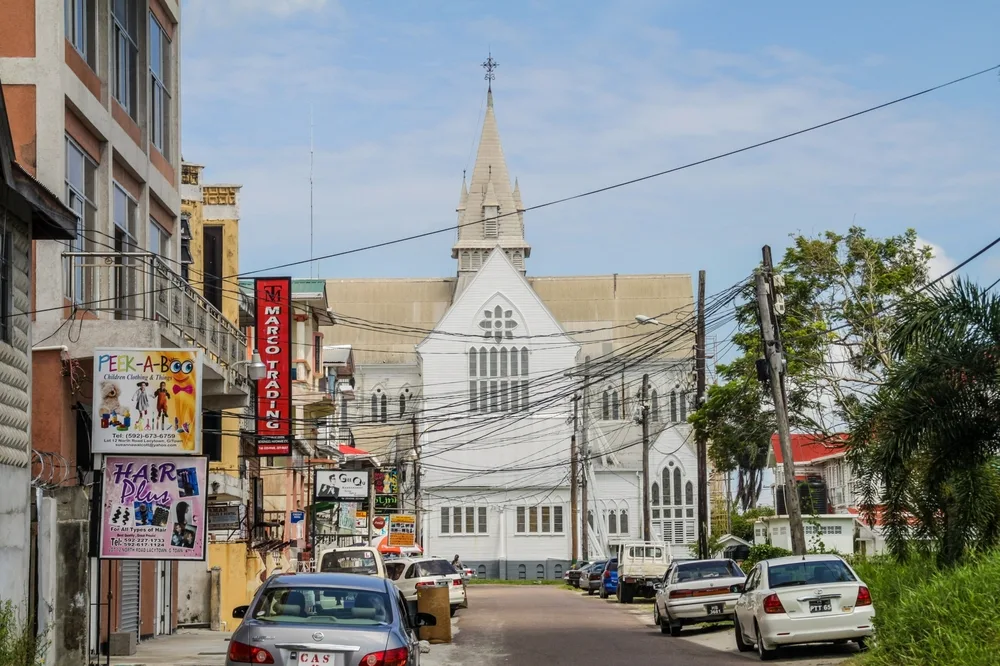
Matyas Rehak/Shutterstock
Avoiding bad areas is key to staying safe in Guyana. Most of the crime in Guyana occurs in Georgetown, the capital.
Certain parts of the capital are more prone to crime than others, including:
- South Georgetown
- Tiger Bay
- Agricola
- Albouystown
- Sophia
- South of Brickdam Street
- Albertown
- Bourda
- Buxton
Some areas of Georgetown are only dangerous after dark. Be careful of robbers at night on the sea wall, near St. George’s cathedral, and around the National Park. Stabroek Market is not very violent but is a prime destination for petty theft so keep a firm grasp on your valuables.
Outside of Georgetown, criminals often target tourists in East Coast Demerara and in the resorts of Essequibo River. Don’t travel to Cheddi Jagan International Airport after dark as armed robbers often target people on the road to the airport.
Things to Consider
Here are additional safety tips that can help you stay safe in Guyana:
- If you want to visit the Botanical Garden in Georgetown, go with a group as there have been cases of criminals targeting individual, isolated visitors, especially distracted birdwatchers.
- Regular power cuts happen in Guyana, so have a power bank on hand for your electronics and maybe a flashlight.
- LGBT travelers may not feel comfortable in Guyana. The country still has laws banning homosexuality and attitudes are generally conservative.
- Taxis are the safest way to get around Guyana, as walking exposes you to criminals and pickpockets will often ride on minibuses to pickpocket fellow passengers. However, make sure that you are taking a licensed taxi. Licensed taxis have number plates beginning with the letter “H” and you can book them by calling a dispatcher instead of hailing one off the street.
Frequently Asked Questions
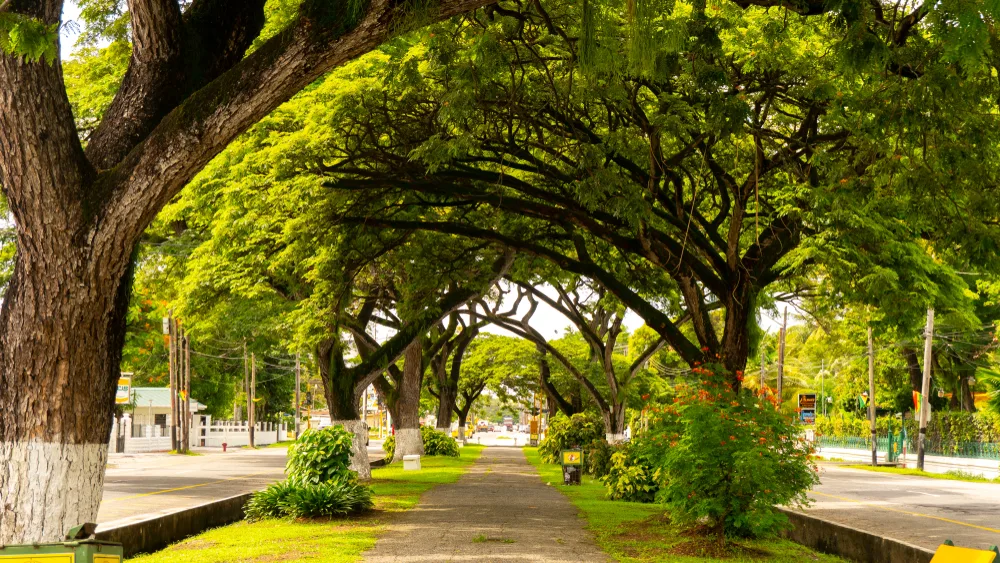
La Rose Photography/Shutterstock
Here are some other questions that you may want answered before going to Guyana:
Is Guyana tourist-friendly?
Guyanese people have a reputation for being very friendly, but the country itself is not very tourist-friendly. Crime rates are very high, and tourists are often victims. Plus, there is not a lot of tourism infrastructure in place, including accommodation and inter-city transport.
Do people vacation in Guyana?
Very few people come to Guyana on a relaxing vacation. Guyana receives only a few thousand foreign visitors a year. Most are Guyanese diaspora or their descendants, while others are adventure travelers.
Is it safe to walk in Georgetown, Guyana?
Georgetown, the capital of Guyana, is not the safest place to walk, especially not at night. Walk in a few safe areas but take a taxi to get around the city.
Why do tourists visit Guyana?
The few tourists who do come to Guyana are rewarded with amazing nature, including rainforests, savannahs, and beaches. Plus, most of this nature is very well preserved.
Is Guyana cheap or expensive?
For visitors coming from Western countries, Guyana is an affordable place to visit. The price of most things, from transport to food, is fairly low.
So, Should You Travel to Guyana?
It is possible to come to Guyana and have a good time, especially when you head out into nature. However, you will have to be on your guard for most of your trip, especially when you are in Georgetown. Happy travels!



